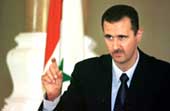Syria to help Russia retrieve influence in Middle East
European states, not to mention China, will not come into conflict with the USA over Syria – Iraq is enough
Syrian President Bashar al-Asad is starting his official visit to Russia today. It is definitely an extraordinary event in the world of politics. Syria is one of the main candidates for “democratization” according to the incumbent US administration. The USA and Israel will undoubtedly be watching the process of negotiations in Moscow. 
It is noteworthy that the visit of the Syrian president to Russia was preceded with an international scandal that the Israeli government caused. Prime Minister Ariel Sharon addressed to the Russian government with a request (or a requirement) not to conclude any contracts with Syria for the delivery of Iskander-E missile systems. The Israeli administration believes that terrorists might get those systems in their possession. The USA in its turn raised the issue of sanctions too, although American officials called upon everyone not to speed up events and wait for the official confirmation of the news, when the contract is finally signed. Russian Defense Minister Sergei Ivanov stated that Russia did not have any plans to deliver missile systems to Syria. Internal Affairs Minister Sergei Lavrov confirmed Ivanov's statement later.
In addition to the deliveries of Russian arms, there are other fields of cooperation, in the energy industry first and foremost. The USSR and Russia used to assist Syria in building several hydro and heating plants, which currently provide 30 percent of the country's need in electric power. The government of Syria, however, currently experiences the problem of the national energetic security. The number of electric power stations in Syria is not enough to cover the nation's needs. Oil and gas reserves in the country are rather scanty. The development of the nuclear energy industry would be quite perspective. Russia and Syria signed a series of agreements for cooperation in the nuclear field - the 1999 intergovernmental agreement on cooperation in the field of peaceful use of nuclear power, for instance. The implementation of those agreements, however, was practically frozen. The main reason was not about the USA and Israel's negative attitude to nuclear projects in Mideastern states. Syria does not have enough money to pay for reactors and for the work of Russian specialists. It would be logic to presume that no projects would be retrieved at this point, taking into consideration the fact that the game is not worth the candle. Moscow is not likely to be ready to oppose Washington.
The Russian administration still hopes to gain good profit from the visit of the Syrian president. It goes about Russia's role as a mediator in the regulation of the Mideastern conflict, although Russia does not take any part in it, the Kommersant newspaper wrote. Russia and Syria plan to sign the declaration for cooperation and friendship between Russia and Syria during Bashar al-Asad's visit to Russia. The agreement includes a paragraph about Syria's consent to start negotiations with Israel without any conditions. Furthermore, Moscow plans to convince Syria to withdraw a part of its contingent from Lebanon and cut the support to Hizbollah, Hamas and Islamic Jihad extremists. The Russian government is ready to write off a big part of Syria's debt to Russia in return to the above-mentioned terms – it goes about $14 billion.
Bashar al-Asad will most likely accept such suggestions, although there can be exceptions made, of course. Syria is interested in arms deliveries, modernization of the energetic industry (save the doubtful nuclear cooperation) and the political support. Needless to say that the influence of Russia pales in comparison with the influence of the USSR, although Damascus is not likely to receive help from anywhere else. European states, not to mention China, will not come into conflict with the USA over Syria – Iraq is enough. Russia, however, is interested in cooperation, although the conditions are not very profitable.
On the photo: The President of Syria, Bashar al-Asad
Subscribe to Pravda.Ru Telegram channel, Facebook, RSS!





